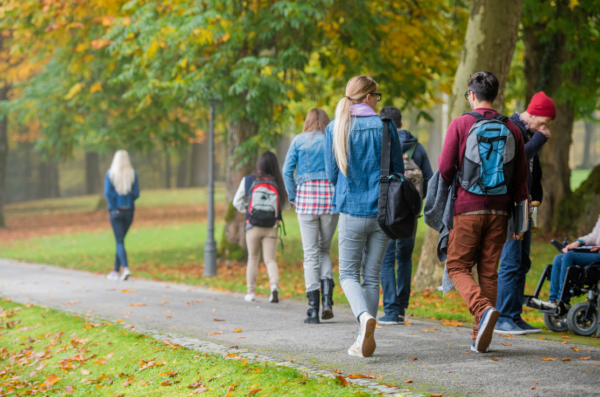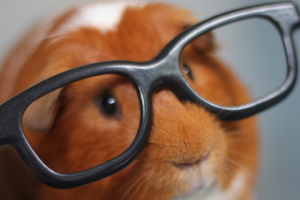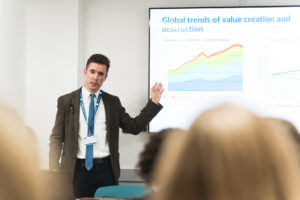
| Date | Author |
|---|---|
| 19th July 2023 | Suzanne Karaca, SUMS Group Marketing and Communications Intern |
Suzanne Karaca is a recent intern in the SUMS Group marketing and communications team. She is a student at the University of Reading studying consumer behaviour and marketing. Here, she writes about how students, such as herself, view sustainability at universities. Reflecting upon her own experience and how her internship gave her a deeper understanding of the environmental impact of universities and their potential to drive positive change.
Don’t all young people care passionately about the environment? Shouldn’t all students be aware of the impact of the universities they choose? It’s an easy assumption to make, but I’d never really considered universities as “businesses” in their own right with such a significant environmental impact. In the hustle and bustle of assignments, exams, and more student societies than I care to mention, it’s not uncommon for sustainability initiatives to become obscured in the grand scheme of university life.
As we get (quite rightly) caught up in the initial excitement and many new experiences of being a university student, we risk forgetting that sustainability directly affects us in many, often unseen ways. It affects everything from the quality of our campus environments to the success and future of our universities. However, it wasn’t until my recent internship with SUMS Group, that I had the chance to peer behind the curtain into the inner workings of universities, from their administrative processes to their financial considerations. These valuable insights have helped to further my understanding of sustainability and its impact in higher education.
Net Zero
Net Zero is a topic I‘ve frequently heard about in discussions about sustainability, but never fully understood. I often pass banners on campus promoting Reading University’s campaign to “become Net Zero by 2030”. But what does that mean? I got the chance to explore this after working on some social media content to promote awareness of Net Zero Week. Put simply, Net Zero refers to achieving a balance between the greenhouse gases produced and those removed from the atmosphere. This tends to focus on reducing upfront emissions and implementing methods to remove emissions from the environment. Pretty important stuff.
To achieve their ambitious Net Zero targets, universities must tackle the three scopes of emissions.
- Scope 1 covers Green House Gases that a company makes directly. This data is the easiest to obtain and allows universities to make informed decisions to reduce their direct carbon emissions.
- Universities also have greater control over their scope 2 emissions – these are indirect emissions that come from where a company’s purchased energy is produced.
- Scope 3 is where it gets more difficult. It covers all other indirect emissions that occur in a company’s value chain. Unfortunately, this is harder for universities to track but often accounts for the highest proportion of total emissions.
During my internship, I learnt that SUPC works with universities to help maximise their carbon reductions through scope 3 reporting. These detailed reports allow universities to identify key areas for reduction and take the necessary steps towards Net Zero.
Interning at SUMS also allowed me to better understand the complexities of university operations. I observed the delicate balance of budget allocations, resource management, and strategic planning that impact a university’s ability to invest in sustainability initiatives.
Sustainable procurement
Another concept that I was introduced to was “sustainable procurement”. As I was starting to understand what procurement was intrinsically, I realised that there was a way to approach it sustainably. Sustainable procurement involves considering the environmental, social, and economic impacts of the products and services we acquire. It goes beyond simply acquiring what is needed; it encompasses a broader perspective of sourcing goods and services in a manner that minimises negative effects on the environment and society.
This all sounds good on (sustainably sourced) paper, but what difference can it actually make? Working with SUMS Group, I’ve had the chance to gain greater understanding of the potential universities have to drive positive change. By putting into place sustainable practices, such as student-led sustainability socials, and engaging faculty and staff through research funding, universities can significantly contribute to efforts in battling climate change and helping create a more sustainable future. I believe universities can do even more to integrate sustainability into different course modules, encouraging a broader range of students to explore and apply it in the context of real-world challenges – not just those who have elected to do so.
By putting into place sustainable practices, such as student-led sustainability socials, and engaging faculty and staff through research funding, universities can significantly contribute to efforts in battling climate change and helping create a more sustainable future.
The big picture
From renewable energy integration and sustainable procurement to behaviour change campaigns, universities have many tools at their disposal to create a significant impact – on both a global scale, and in the context of their local communities Collaboration between students, faculty, and administration is crucial in ensuring the success of these initiatives. My recent experience at SUMS has provided me with a small insight into the sustainable potential of universities. Our universities are already catalysts for so much learning, cultural capital, and societal good. By drawing greater awareness, fostering constructive dialogue, and empowering student engagement on sustainability, they can collectively inspire positive change for people and planet.
Let’s start the conversation
We all stand together on this important journey to Net Zero. For support with sustainability, contact SUMS Group at sums@reading.ac.uk or visit our website here.








